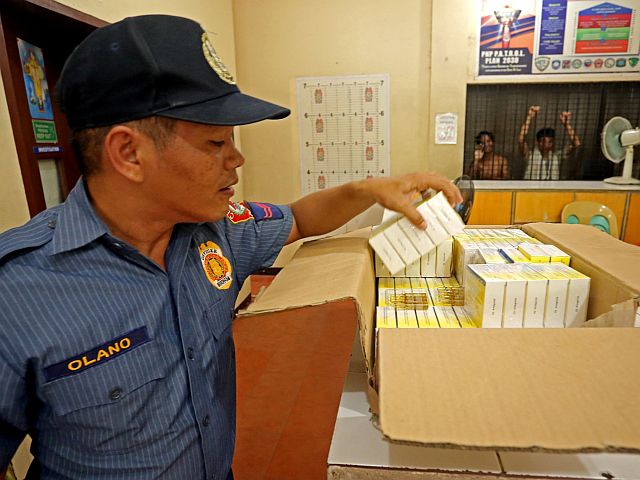
AMPULES of injectable drug believed to be Nubain are being inventoried by personnel from the Parian Police Station in Cebu City after they were turned over to the police unit by four barangay tanods of Kamagayan who were handed the box of drugs by an unknown person (CDN PHOTO/LITO TECSON).
The 799 ampules of injectible drug that were found in a van-for-hire terminal in Barangay Kamagayan, Cebu City last Sunday tested negative of illegal drugs.
The test conducted by the Police Regional Crime Laboratory Office showed that the ampules contained Ranitidine, an anti-ulcer drug that reduces gastric acid secretion.
“Qualitative examination conducted on Specimen A gave negative results to the presence of dangerous drugs. Specimen does not contain dangerous drugs,” said Senior Insp. Mary Garcia, the forensic chemist of the Regional Crime Laboratory Office in its report.
At least 799 ampules placed inside 70 boxes were discovered by barangay tanods in a van-for-hire terminal in Kamagayan, Cebu City.
They immediately turned them over to the Parian police precinct which submitted the yellow-colored chemical solutions to the Crime Laboratory.
Although the boxes were labeled as “Ranitidine Hydrochloride,” the police wanted to make sure that items were not Nubain, a painkiller that was earlier sold in drug stores.
It was declared a restricted drug in 2011 after it was found to be harmful if taken in excessive amount.
Senior Insp. Dexter Basirgo, the chief of the Parian police precinct believed someone left the ampules containing Ranitidine after the person found out that they were not Nubain.
“I believed the ampules were stolen by someone who thought they contain Nubain. But when the person realized that it didn’t have an effect, he decided to abandon it,” he told CDN over the phone.
But in case, a medical representative or another person left it, Basirgo said they could claim the ampules of Ranitidine at the Parian police precinct.
“Of course, we could not discount the possibility that someone entitled to hold this substance left it,” the police station chief said.
If no one will claim it, Basirgo said he will turn the ampules of Ranitidine to the Philippine National Police hospital located within the Cebu City Police Office compound along Gorordo Street, Cebu City.
Basirgo said they failed to trace who left the ampules of Ranitidine at the GT Express Terminal last Sunday.
Nezen Tomabini, the regulatory compliance officer of the regional Philippine Drug Enforcement Agency confirmed that Ranitidine is not a prohibited drug.
“That (Ranitidine) is used to treat ulcers and gastroenteritis. It has never been among those drugs prohibited under Republic Act 9165 (Comprehensive Dangerous Drugs Act of 2002),” she said.